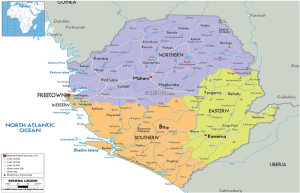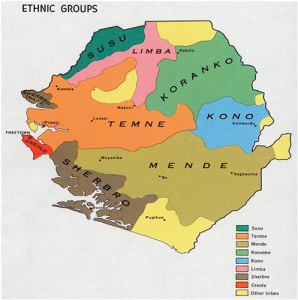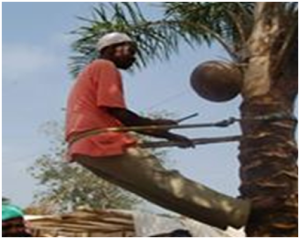History Of The
Limbas
 As stated in Wikipedia, Sierra Leone, West Africa, is bounded by Guinea in the north and east, Liberia in the east and south, and the Atlantic Ocean to the south and west. There is savannah in the north and mountainous highland plateau in the east. Sierra Leone possesses rich deposits of alluvial diamonds, as well as minerals including rutile and bauxite and also agriculture and fishery resources. Its stunning beaches offer potential for tourism development.
As stated in Wikipedia, Sierra Leone, West Africa, is bounded by Guinea in the north and east, Liberia in the east and south, and the Atlantic Ocean to the south and west. There is savannah in the north and mountainous highland plateau in the east. Sierra Leone possesses rich deposits of alluvial diamonds, as well as minerals including rutile and bauxite and also agriculture and fishery resources. Its stunning beaches offer potential for tourism development.
 Sierra Leone consists of 18 different ethnic groups with no single ethno-linguistic group forming an absolute majority. Main ethno groups include: Mende ,Temne, Limba, Krio, Kuranko, Kono, Fula/Fulbe/Fulani, Sherbro, Loko, Susu, Mandingo, Kissi, Yalunka, Vai, and Kru. The Mende inhabit the south and have benefited from the relative prosperity of their southern homeland. The Temne live an area inland from the coast to an area north of Mendeland. The Limba, in the Northern Province; and the Kono and Kissi in Eastern Province. Kuranko, Fula, Loko, Susu and Mandinka also live in the north.
The Limba people (herein Known as the Limbas) form the third largest ethnic group and among the earliest indigenous inhabitants of Sierra Leone. Oral history reveals that they have no tradition of origin; they have always lived in Sierra Leone and were probably the first rulers of the country. However, it is believed by some historians that like the Temne, they are descendants of a once-powerful tribe coming from Fouta Djallon during the 12th century and settled around the Wara Wara hills in the northern interior. They speak various dialects of a language largely unrelated to other tribal languages in the country. Major Limba dialects include: Biriwa, Safroko, Thonko, Wara Wara and Sela.
Limbas are primarily found in the savannah woodland region in the Northern Province, particularly in Bombali District, Koinadugu and Kambia District. During Sierra Leone’s colonial era thousands of Limbas migrated to the capital city of Freetown and its Western Area. As a result, a significant number of Limbas can be found in Freetown and its surrounding Western Area. They predominate in 7 of Sierra Leone’s 149 rural chiefdoms, and their community affairs are dominated by the local paramount chiefs. During the 16th, 17th, and 18th century, many Limbas were shipped to North America as slaves. However, some historians believed that the limbas were never enslaved because they predominantly lived in inaccessible areas in the mountains or outskirts of town.
The Limbas are mainly rice farmers, traders and hunters, but also specialized in palm wine tapping. Palm wine is an alcoholic beverage created from the sweet sap of a palm tree. The Limbas are very hard working people, their knowledge of agriculture and trade has built a society based on the ideal: “If you work hard and respect the land properly then you are worthy to enjoy the fruits of your labor”.
Sierra Leone consists of 18 different ethnic groups with no single ethno-linguistic group forming an absolute majority. Main ethno groups include: Mende ,Temne, Limba, Krio, Kuranko, Kono, Fula/Fulbe/Fulani, Sherbro, Loko, Susu, Mandingo, Kissi, Yalunka, Vai, and Kru. The Mende inhabit the south and have benefited from the relative prosperity of their southern homeland. The Temne live an area inland from the coast to an area north of Mendeland. The Limba, in the Northern Province; and the Kono and Kissi in Eastern Province. Kuranko, Fula, Loko, Susu and Mandinka also live in the north.
The Limba people (herein Known as the Limbas) form the third largest ethnic group and among the earliest indigenous inhabitants of Sierra Leone. Oral history reveals that they have no tradition of origin; they have always lived in Sierra Leone and were probably the first rulers of the country. However, it is believed by some historians that like the Temne, they are descendants of a once-powerful tribe coming from Fouta Djallon during the 12th century and settled around the Wara Wara hills in the northern interior. They speak various dialects of a language largely unrelated to other tribal languages in the country. Major Limba dialects include: Biriwa, Safroko, Thonko, Wara Wara and Sela.
Limbas are primarily found in the savannah woodland region in the Northern Province, particularly in Bombali District, Koinadugu and Kambia District. During Sierra Leone’s colonial era thousands of Limbas migrated to the capital city of Freetown and its Western Area. As a result, a significant number of Limbas can be found in Freetown and its surrounding Western Area. They predominate in 7 of Sierra Leone’s 149 rural chiefdoms, and their community affairs are dominated by the local paramount chiefs. During the 16th, 17th, and 18th century, many Limbas were shipped to North America as slaves. However, some historians believed that the limbas were never enslaved because they predominantly lived in inaccessible areas in the mountains or outskirts of town.
The Limbas are mainly rice farmers, traders and hunters, but also specialized in palm wine tapping. Palm wine is an alcoholic beverage created from the sweet sap of a palm tree. The Limbas are very hard working people, their knowledge of agriculture and trade has built a society based on the ideal: “If you work hard and respect the land properly then you are worthy to enjoy the fruits of your labor”.
 The Limbas take pride in their unique language which differs from the other languages spoken in Sierra Leone. As a result, Limbas strive to be very articulate with their vocabulary as a way of sticking out among the rest. The uniqueness of the Limbas is also manifested in their cultural dance (The Mathorma dance) which is demonstrated by repetitive jumping and pounding of the feet as a show of pride, happiness and strength. The Mathorma is a Limba masquerade which is believed to possess mystical and protective powers but also used as entertainment to promote peace, love and unity.
The Limbas in the southern province are mostly influenced by Christianity. While those in the Northern Province are somewhat influenced by Islam. Some still practice their traditional religion as well. Sierra Leonean society has long been notable for its religious tolerance, and most public events are preceded by Muslim and Christian prayers in which everybody participates. Consciousness of tribal affiliation, albeit harmlessly, still exists.
Throughout the 1950s and 60s, the Limbas suffered social stratification and marginalization in Sierra Leone. During those times, other tribes did not want to associate themselves with the Limbas, who were viewed as socially backward. It was demeaning to be identified as a limba. This was evident in a popular saying in Sierra Leone that “I would rather have scabies or sore than to be a Limba”. (However, this perception changed when the third prime minister and first elected president of Sierra Leone, late Siaka Stevens, openly identified himself as Limba). The direct result of this marginalization was the benign neglect by successive governments and Non-governmental agencies to take development to the Limba communities, more especially the northern province.
The scars of neglect are still visible in the Limba communities. No good roads and means of transportation. Poor water supply and sanitation, Poor school systems with few parents enthusiastic to send their kids to school, mainly due to high cost of school fees but also due to schools located so far away from the child’s home. Illiteracy rate in the Limba communities is very high, especially among the girl child. Most Limba communities have little or no electricity and very poor medical facilities.
Mabohanday USA aims to change this narrative and trajectory. We seek to bring people of Limba descent together, not only to form a stronger community, but also to foster socio-economic advancement of mostly underserved Limba communities through sustainable development initiatives. These initiatives include among other things, providing educational support like books, financial aid through scholarships and other resources to ambitious and excellent Limba students, providing medical equipment and supplies to hospitals, and assist with the development of good roads, schools, water supply and sanitation. Mabohanday also aims to preserve, enhance and perpetuate the unique and distinctive Limba culture and traditions and most importantly, promote cultural awareness and the Limba values of FRIENDSHIP, GENEROUSITY, COURAGE, RESPECT, HUMILITY, LOYALTY AND HONESTY.
COMMON LIMBA VOCABULARY
The Limbas take pride in their unique language which differs from the other languages spoken in Sierra Leone. As a result, Limbas strive to be very articulate with their vocabulary as a way of sticking out among the rest. The uniqueness of the Limbas is also manifested in their cultural dance (The Mathorma dance) which is demonstrated by repetitive jumping and pounding of the feet as a show of pride, happiness and strength. The Mathorma is a Limba masquerade which is believed to possess mystical and protective powers but also used as entertainment to promote peace, love and unity.
The Limbas in the southern province are mostly influenced by Christianity. While those in the Northern Province are somewhat influenced by Islam. Some still practice their traditional religion as well. Sierra Leonean society has long been notable for its religious tolerance, and most public events are preceded by Muslim and Christian prayers in which everybody participates. Consciousness of tribal affiliation, albeit harmlessly, still exists.
Throughout the 1950s and 60s, the Limbas suffered social stratification and marginalization in Sierra Leone. During those times, other tribes did not want to associate themselves with the Limbas, who were viewed as socially backward. It was demeaning to be identified as a limba. This was evident in a popular saying in Sierra Leone that “I would rather have scabies or sore than to be a Limba”. (However, this perception changed when the third prime minister and first elected president of Sierra Leone, late Siaka Stevens, openly identified himself as Limba). The direct result of this marginalization was the benign neglect by successive governments and Non-governmental agencies to take development to the Limba communities, more especially the northern province.
The scars of neglect are still visible in the Limba communities. No good roads and means of transportation. Poor water supply and sanitation, Poor school systems with few parents enthusiastic to send their kids to school, mainly due to high cost of school fees but also due to schools located so far away from the child’s home. Illiteracy rate in the Limba communities is very high, especially among the girl child. Most Limba communities have little or no electricity and very poor medical facilities.
Mabohanday USA aims to change this narrative and trajectory. We seek to bring people of Limba descent together, not only to form a stronger community, but also to foster socio-economic advancement of mostly underserved Limba communities through sustainable development initiatives. These initiatives include among other things, providing educational support like books, financial aid through scholarships and other resources to ambitious and excellent Limba students, providing medical equipment and supplies to hospitals, and assist with the development of good roads, schools, water supply and sanitation. Mabohanday also aims to preserve, enhance and perpetuate the unique and distinctive Limba culture and traditions and most importantly, promote cultural awareness and the Limba values of FRIENDSHIP, GENEROUSITY, COURAGE, RESPECT, HUMILITY, LOYALTY AND HONESTY.
COMMON LIMBA VOCABULARY
- Inseh – How are you
- Yan do pethoi – I’m fine or I’m well
- Na meh waliban – How is work?
- Yan kalahan kanu nan – Glory be to God
- Sa ka thorma – Lets eat
- N’na – Mother
- Handan – Father
- Yeremeh okiyan na won – This is my wife
- Hati okiyan na won – This is my child